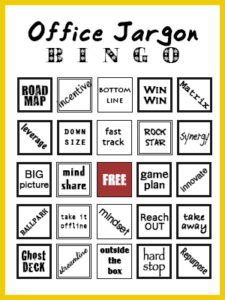Talking Shop: The Things We Say
 Part of the fun of being a consultant is using our own, special vocabulary. (And recognizing that sometimes, to other people, we sound ridiculous.) But more importantly, when done well, jargon can add to your credibility and perceived competence.
Part of the fun of being a consultant is using our own, special vocabulary. (And recognizing that sometimes, to other people, we sound ridiculous.) But more importantly, when done well, jargon can add to your credibility and perceived competence.
Some of our consultant-speak is technical terminology, while some of it is just buzzwords. And the words will change over time based on the latest hot business book or Harvard Business Review topic. Believe it or not, well-placed lingo can help you both fit in with a group of jargon-happy fellow consultants and give your customer the confidence that you are a seasoned consultant with real expertise to bring to bear.
So, let’s have some fun and talk about some common “consultant-speak” to make sure that, well, we’re “all on the same page”.
“Boiling the ocean”: Trying to solve too much at one time. The scope is too big for one project, so break it up into more than one phase or solve the simplest problems first. Often used when the client is trying to keep costs down and avoid an overly ambitious project scope (or the consultant is trying to convince the client that they’re overcomplicating something).
Example: “We’re not trying to boil the ocean here. We just need to get the system out the door!”
“Low-hanging fruit”: The stuff we’re going after when we’re not boiling the ocean, these are the simplest, easiest to understand and most solvable problems.
Example: “While we’re prioritizing our actions, let’s be sure to take care of the low-hanging fruit and get some quick wins.”
“Going native”: When a consultant stops acting like a consultant and starts thinking like they’re part of the client organization. It usually means you aren’t providing the same value you were in the beginning. You’ll also know this is happening when you start making excuses for why the project cannot proceed.
Example: “If you’re going to go native, just go ahead and apply for a permanent job.”
“Paradigm”: A common way of thinking about or accomplishing something. This term is most often used by consultants when we’re shifting or breaking them.
Example: “When ownership of the order fulfillment project moved from Operations to Sales, it caused a paradigm shift that resulted in a whole new project strategy and approach.”
“Running in parallel”: Having nothing to do with exercise, this refers to processing normal operating data through two systems simultaneously to compare performance and output and find problems that were missed during testing.
Example: “We’ve been testing all month, but the client is still paranoid about our new system, so we’re going to spend the month running it in parallel with their old one to prove it’s ready.”
“Talking to the dog”: Thinking through a problem by talking through it out loud. To yourself. Or to your dog, if he’s a good listener.
Example: “I was driving home, just talking to the dog, and I figured out how to resolve the issue.”
“Bandwidth”: Refers to time or availability to do work, especially additional work. Often it is used to communicate when you are not able to do the work.
Example: “I don’t have any bandwidth to take on a new client right now.”
“Use case”: A particular circumstance or situation for which a specific solution would be used. A business analyst should create use cases for all the different steps in a process to determine how a system will be used.
Example: “The engineer referred to all the documented use cases. She’s confident the system will be effective in each situation.”
“Holistic”: A solution that thinks of everything by taking into account all upstream and downstream impacts. Or something like that. At any rate, it’s a classic consulting term that we use all the time.
Example: “By taking a more holistic approach, we can limit any negative impacts from implementing this new process.”
It’s difficult to keep the list of consulting terms this short because, as any client will tell you, we sometimes like to hear ourselves talk, and the way we say things is sometimes worthy of being roasted by a standup comedian. That being said, it’s important to know and use the right jargon at the right time (albeit sparingly), and to use it to actually try and communicate clearly.
While you’re practicing, you can enable a new communicative paradigm by generating more dynamic synergy via a holistic approach to tackling the low hanging fruit with your excess bandwidth. And if that meant something to you, you’re way ahead of me!
